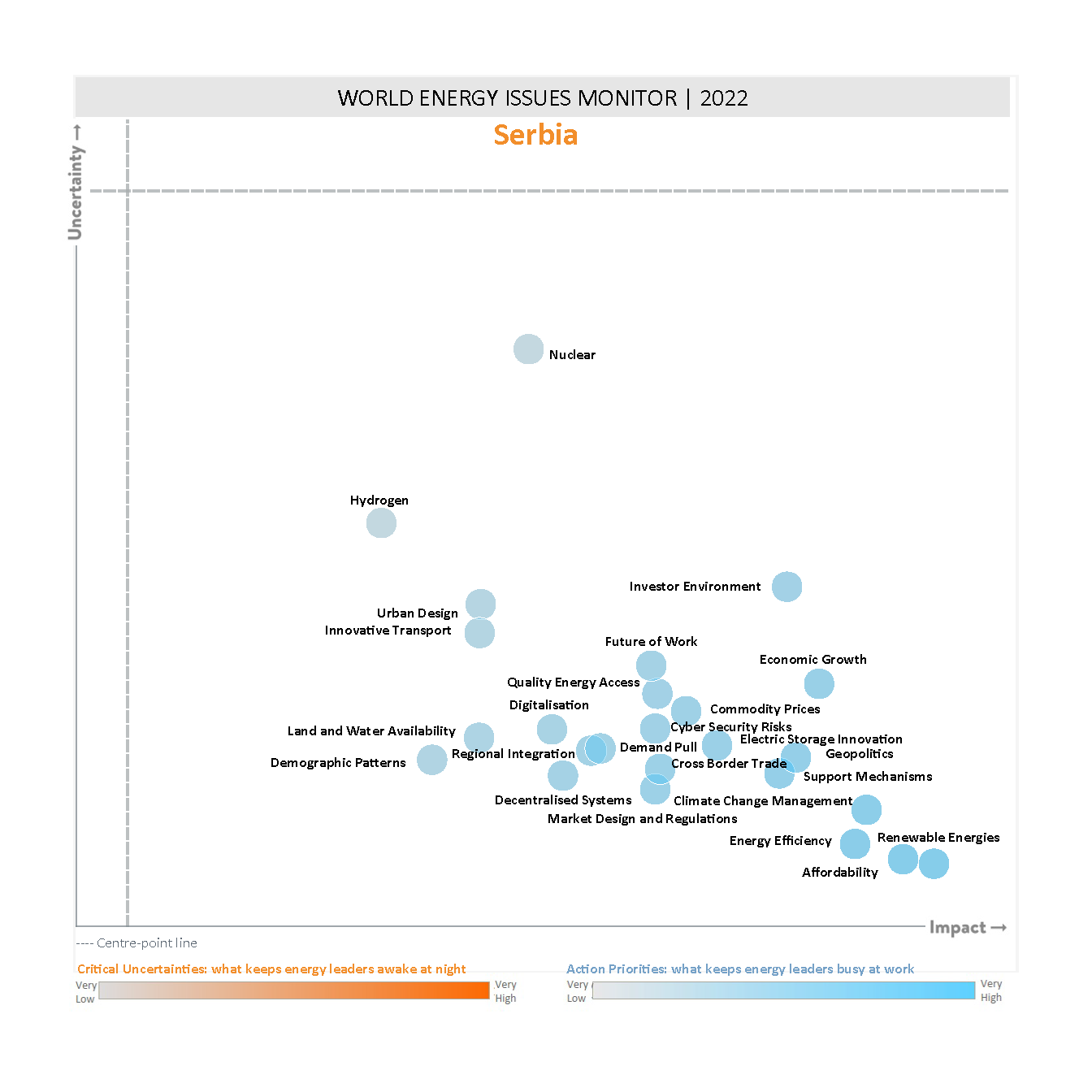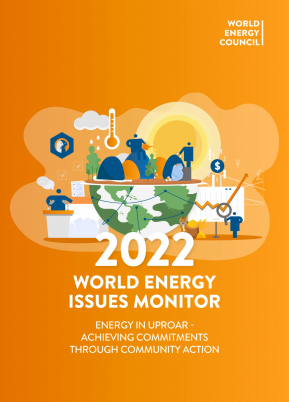Serbia (at that time part of Yugoslavia) became a member of the World Energy Council in 1924. As one of the WEC’s founders, the Yugoslav World Energy Council Member Committee, including high federal government officials and leading experts in all energy sectors, was active all the time both on local and international scene. At present the Serbian World Energy Council member committee is continuing this practice. Its membership (individuals from governmental institutions, universities, scientific institutes, energy industries and consulting and other companies, as well as from professional associations in the energy field as the MC collective members) takes an active part in all energy related matters in the country.
Dr. Nenad Djajić, chair of the Serbian Member Committee of the World Energy Council, is Professor Emeritus at the Mining and Geology Faculty of Belgrade University. In parallel to teaching students, he has gained experience in solving complex energy problems, including energy strategies, studies and projects in energy efficiency, spatial planning, municipal energy, modelling and balancing energy-producing processes and promotion of renewables. Dr Djajic is the vice-chairman of the Serbian Scientific Society, a full member of the Serbian Academy of Engineering Sciences, and Editor-in-Chief of journal “Energy”. He is the author of 3 university textbooks and 4 monographs, as well as of more than 470 papers. He took part in more of 230 studies and projects in the field of energy and reviewed 19 university textbooks and monographs. As a participant of many international and local conferences, he presented papers on the sustainable development energy in Serbia, the optimum structure of final energy consumption, improved energy efficiency and use of local energy sources.
Dr Miodrag Mesarović, Secretary General of the Serbian WEC Member Committee, is a Senior Advisor in Energoprojekt Entel Consulting Engineers Co. in Belgrade. He graduated from the Electrical Engineering Faculty University of Belgrade, and specialized in nuclear technology in Sweden and France. He holds a doctorate of Technical Sciences from the Mechanical Engineering faculty of the University of Belgrade. His professional experience includes local and international energy projects’ planning and design, nuclear safety and environmental protection, as well as strategic energy sector development planning, energy economy, and financing in the energy sector. He was an invited lecturer for postgraduate studies at several universities of former Yugoslavia. Dr Mesarovic is a full member of the Serbian Academy of Engineering Sciences and chair of the Academy's Energy Board. He is chair of the Scientific Board of the Serbian Association of Thermal Engineers, as well as member of the Board of the Serbian Nuclear Society and a member of the Serbian National Committee of CIGRE. Dr Mesarovic is author of over 270 scientific and professional papers, as well as many monographs and university textbooks.
Energy in Serbia

With the recent rising of energy prices and concerns of irreversible climate change, energy transition to low carbon sources becomes a critical issue for Serbia, a country with coal as its major indigenous energy resource. The positions of Serbian World Energy Issues Monitor respondents coming from various sectors and of recently contacted stakeholders may roughly be divided into two groups, one in favour of coal use until its complete exhaustion (around 2050) or only until the (earlier) end of operational lifetime of power plants, and another in favour of a faster transition towards natural gas and renewables. Both groups agree that the energy transition is a difficult and costly endeavour for Serbia, bearing in mind that its cheap coal is currently used to generate around 70% of total country’s electricity consumed.
There is a critical uncertainty that Serbia could ensure quality energy access for its consumers through a fast transition away from coal with its current economic strength and economic growth, which may be jeopardised by the increase of energy import dependency. The transition may also disturb the future of work with closing down of coal mines, because the coal mining is the major single employer in the country. Critical uncertainty is also the investor environment: since new generation from coal is not attractive, the investments are mainly directed to upgrades of the existing power plants that remain in operation while shutting down older ones. Since renewables alone may not be sufficient for long-term generation including natural gas as a transitional fuel, the nuclear option is frequently candidate for the long-term energy mix. However, this option is highly uncertain because of the moratorium on nuclear power plants, imposed by law (Official Gazette of the Republic of Serbia 85/2005). There is a possibility for Serbia to enter partnership with neighbouring Hungary or Bulgaria in their nuclear projects prior to building its own plants provided that moratorium would be abolished.
Therefore, promotion of Renewable Energies, Energy Affordability, Energy Efficiency, Climate Change Management and Support Mechanisms remain the top Action Priority issues for Serbia. To achieve its goal of 50% share of renewable energies in gross final energy consumption by 2040, Serbia enacted a separate Law on the use of renewable energy sources (Official Gazette of the Republic of Serbia 40/2021) to attract new investments in renewables through modified support mechanisms for electricity from renewable sources. Also, the Law on energy efficiency and rational use of energy (Official Gazette as above) was enacted in 2021 to enhance energy efficiency by a wide range of supports for such projects. An important force to drive efficiency up will come with an expected increase in energy prices due to carbon taxes regulated by recent Law on climate change management (Official Gazette of the Republic of Serbia 26/2021) and already drafted Low Carbon Development Strategy, as well as by the EU Carbon Border Adjustment Mechanism. As a consequence of both carbon taxation and rising share of electricity generation using imported gas, the prices will increase considerably, thus reducing affordability of many consumers to use and pay electricity as before.
Under these circumstances, regionally integrated energy markets with increased interconnection capacity with neighbouring countries is seen as crucial for optimal integration of renewables and efficient electricity trading across borders, as well as for addressing issues related to energy security. Regional market integration projects therefore remain an action priority for Serbia such as the ‘Western Balkan 6’ initiative in the context of the Energy Community in the South-Eastern Europe.
TESTING PERSPECTIVES WITH THE WEC SERBIA MEMBER COMMUNITY
The results of the World Energy Issues Survey were discussed with WEC Serbia members in January and February 2022. During the discussion, the key findings regarding Action Priorities and Critical Uncertainties were confirmed and the following three theses were highlighted:
1. Strategic planning for the longer-term energy supply
With most of the country’s hydro potential already in use, and a limited potential of other renewables, Serbia faces a difficult and costly transition from its coal. Opinions shared during issues survey indicate that ensuring a well-established long-term energy strategy is the best opportunity for advancing energy transition. Serbian Ministry of Mining and Energy is already drafting new Energy Strategy by 2040 with Integrated Energy and Climate Plan by 2030, both with visions by 2050. Benefits from such a longer-term planning include decentralisation and diversification of energy supply, and widespread digitalisation of energy systems to ensure demand-side innovation and prosumer engagement.
2. Preparing for a manageable more distributed energy system
Serbia particularly needs to focus on its very ambitious growing share of renewables in the gross final consumption. As the energy system with renewables becomes more distributed, the utilities should transform from simple electricity suppliers to energy-service platforms, while the consumers are becoming prosumers. A new data architecture is required to support the decentralised energy system with two-way flow of electricity and to process a massive amount of data, generated from smart meters and other digital grid components. However, an efficient digitalisation of the energy systems, including ‘big data’, block chain, smart grids, smart meters and other digital technologies, requires new technologies to be applied at the consumer level as well.
3. Local expertise indispensable for sensitive energy decision-making
Due to its lack of funding, Serbia often looks for foreign assistance in various energy matters, usually associated with foreign expertise and solutions without profound insight in local social and economic environment or responsibility for eventual failures. For adequate solutions in those extremely sensitive energy issues such as transformational agenda towards decarbonisation, emphasis is put on local expertise needed to support governmental and corporate decision-making and help a wider education in the energy matters alongside with setting up of a multidisciplinary national institute for energy.
Acknowledgements
Serbia Member Committee
Miodrag Mesarović
Downloads

Serbia Energy Issues Monitor 2022
Download PDF
World Energy Issues Monitor 2022
Download PDF






_368_520_s_c1_c_c.png)





